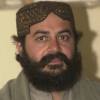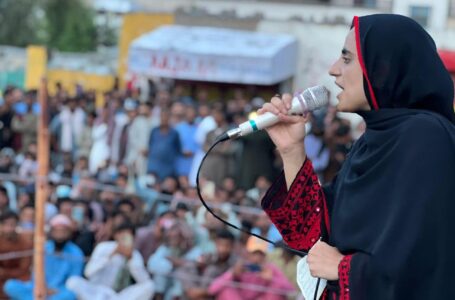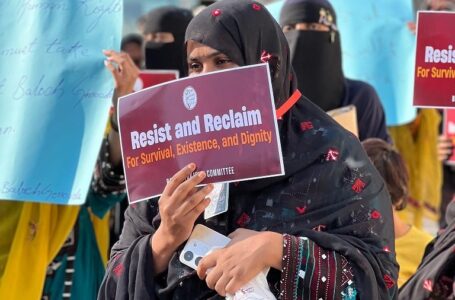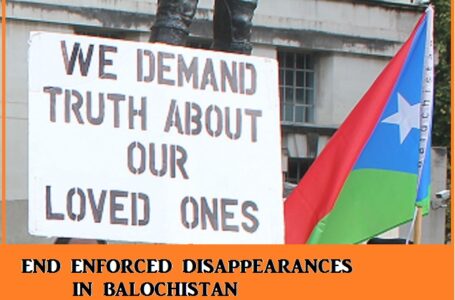Baloch Students’ Forced Disappearances on the Rise: BSAC Demands Immediate Action
Ah Balaach!

“The demise of nations comes not due to annihilation but capitulation,” an age-old Balochi maxim – almost forgotten by ordinary folks – invoked by him with full vigour in his last interview. Without a shred of doubt, Mir Balaach Marri held a firm belief in the essence of this ancient dictum till the last moment of his life.
The wounds inflicted by Punjab’s mercenary squad in Tratani were raw and fresh; the very forces of chaos, after only a short span of time, struck back in Sarlat, a historical region that gave birth to the modern day resistance movement. This time, the target was Mir Balaach Marri. As a standard–bearer of the Baloch cause, he was a marked man from day one.
Like Mir Mehrab, Agha Karim, Hameed Baloch, Asad Mengal, Nawab Bugti, Khalid Jan and many other valiant sons of this nation – Balaach too, was a happy martyr; he chose this path in high spirit, despite knowing the hazards lying in every step of this journey. He, however, rightly insisted that this is the only avenue that leads to emancipation. As Thucydides, the ancient Greek historian of the Peloponnesian War invokes these wise words in defence of such a gallant fighter:
“…if the only choice was between submission with loss of independence, and danger with the hope of preserving that independence, in such a case it is he who will not accept the risk, that deserves blame, not he who will.”
No one had a clue that this courageous man was on a history-making path; neither could anyone gauge his credentials: his allegiance to motherland and its inhabitants. Cynics, though, bet heavily on false notions that by raising the spectre of the Baloch Cause he would be aiming to strike a bargain with occupiers. While others even went further by whispering that he would soon find his place in a club of politicians whose sources of power chiefly derive from the largess provided by their masters in Punjab.
As usual, they were dead wrong.
Such demeaning blitz on Balaach was erupting from a bunch of people whose collective role as a custodian of Punjab’s interests in Balochistan – makes them no less repugnant than those who served as the guards of Nazi concentration camps during the Second World War. That collaborationist elite surely underestimated Balaach’s iron resolve.
Balaach grew up in times when state terror was on its height and Baloch were dying in large numbers. He went to school under the shadow of the Chamalaang massacre; he saw and felt closely the deaths and ruins across the land brought by Punjab’s military which received a helping hand from the Phelavis of Persia. Indeed, they both found a common cause, hence a common enemy.
It was this ghastly period which shaped his conscience and character. His statements and interviews clearly reflect a set of belief that he held throughout his life. His most moving discourses to public were grounded in the images of the shame of slavery, pride of freedom, the agony of the humiliating occupation and the breakable power of enemy. In doing so, he was actually pointing to the severity of the threats to our existence, and also the depths to which we as a nation were prone to drift but at the time he was able to summon us to hope.
True, a Baloch child is a natural born nationalist in wartime. In Balaach’s case, there was something unique, something rooted in his upbringing too which played a greater role: he was nurtured by a father who has a grand-standing in modern Baloch history. A man who has devoted almost entire his life to a cause and spearheaded the movement whether in war or peace.
As thousands of Baloch made their way to Afghanistan in the aftermath of 1970s war, Balaach was very much part of this incredible journey. And later his student days in the Soviet Union, he witnessed the seismic waves that swept across Eurasian landscape: the old order was unravelling before his eyes; and he stood and watched the historical events that accelerated the collapse of Soviet empire and the emergence of several nation states from the ruins of what many of us believed the preeminent superpower. He embraced the fact that artificially constructed bonds under communism were much weaker than the nationalistic aspirations of the very people who preserved their cultural values despite decades of imperial repressions.
To understand Balaach’s transformative role in Baloch politics, one has to put the post war period of Baloch politics in context.
The leadership vacuum emerged in the early 1980s, was filled by a group of politicians who unfortunately not only lacked the charisma, but were completely detached from the historical realities. Such shortcomings hindered their ability to move forward. They found it exceedingly difficult to define the whole purpose of the Baloch struggle in the absence of a clear vision. Instead, most of the political parties that claimed to be representing the Baloch cause became trapped in a long internal battle. Unnecessary factional fighting deteriorated public confidence toward the Baloch cause. While military establishment gained enormously from these pitfalls, turning such condition into a strategic advantage for itself and continued to foment tribal feuds which led to a series of intra and inter-tribal clashes. But this was only part of the story.
Having seen us so weak and fragmented, Islamabad planned to get an absolute grip on Balochistan. They devised a grand plan with an intention to turn the entire region into a mini Punjab in the guise of “development projects.”
During these chaotic times Mir Balaach emerged as the sole champion of emancipation. He came up with a clear vision and above all a strategy to advance this vision. To make things clearer, he drew a sharp line between two extremities of Baloch politics: on the one hand, there are those utopians who tend to rely on empty moralism and legalism, pretending that Pakistan’s shoddy democratic process would eventually deliver; and those realists, on the other hand, who believe that any illusionary desire of harmony of interests between Punjab and Balochistan would ultimately prolong the suffering of the masses and thus, such wishful thinking is no less than an unwitting attempt by the federalists to legitimise six-decade long occupation.
Balaach was the proponent of later school. He and Nawab Akbar Bugti both well understood the logic of war and peace. Unlike others, they correctly argued that morality is the function of politics, not the other way around; and without power all legal or moral imperatives are null and void.
Balaach was through and through a man of the Baloch traditional class. The virtues such as sacrifice, bravery, loyalty, patriotism, he upheld and defended till the last moment of his life are no different than the ones preached and instilled by the ancient Athenians, Spartans and Romans to their citizens. With such a huge sacrifice, Balaach restored the pride of the nation, there has to be more Balaach if the hope of freedom is to succeed.
We should remember Balaach today above all, and salute his bravery and nobility.
Re posted from in search of Baloch national interest – By Belaar Baloch










